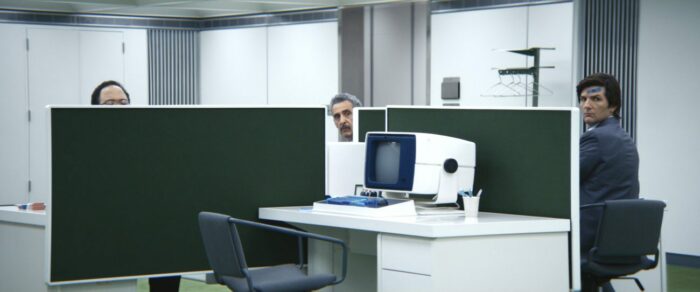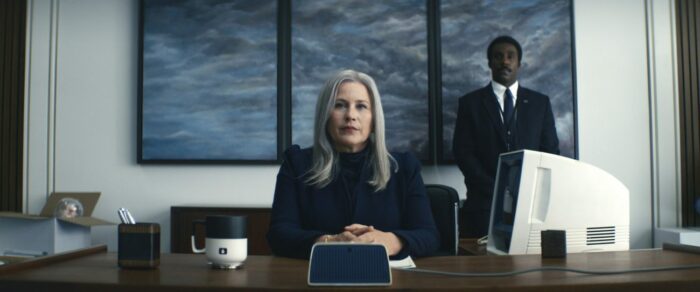The following contains spoilers for Severance S1E1, “Good News About Hell” (written by Dan Erickson and directed by Ben Stiller)
Severance opens with Helly (Britt Lower) lying on a conference table, but of course we don’t know that her name is Helly yet. That’s OK, though, because neither does she. A disembodied voice through an intercom greets her upon her awakening with a blunt, “who are you?” and the tone of the show is established right out of the gate.

Severance is dark but with a quirky humor running underneath that darkness, which is surely aided by the casting of Adam Scott in the lead role. If you’re like me, you’ll have immediately recognized his voice as the one coming through the intercom, and it serves the scene well to have this voice conjure associations to Parks and Recreation or Party Down.
Indeed there is a humor that runs through the survey as a whole, which we can glean aims to determine that Helly doesn’t know who she is or what Mr. Eagan likes for breakfast. The point is to check that the severance procedure she’s just undergone has worked. And it has. A perfect score! We’ve no idea why she chose Delaware.
The premise of Severance, playing on the word to suggest a cutting off of one’s work life from one’s life outside of work, is an intriguing one, which you could well imagine bubbling up in a moment of reverie during some slog of a job. Wouldn’t it perhaps be better to not remember this?
In some ways, it stands in stark contrast to the structures of power that are increasingly common to the world we live in, which often assert themselves more along the lines of expecting us to always be at work, but in others we may feel a resonance. Clearly one question at play here is to what extent performing job duties is an excuse, moral or otherwise.

It is often taken as such, or at least there are any number of instances where someone will try and play it that way. Whether we let them is another story. Perhaps we shouldn’t, but we often do let people off the hook because they were just doing their job. And maybe at least sometimes we should. I don’t want to excuse the Nazi soldier, but I do kind of want to excuse the customer service rep on the phone who gives me the runaround because they actually aren’t allowed to give me straightforward answers. It’s a difficult question if you start getting into the details.
It also raises a question that is even more difficult about personal identity. Am I the same person I was yesterday, given that I have changed in all sorts of ways, and am indeed constantly changing not just physically but psychologically? If you want to say yes (which you do), the most common ways of securing such identity of self over the course of time are to either appeal to (1) a soul that perdures beneath all of these changes and provides some kind of stable essence to one’s being; or (2) the continuity of memory/consciousness. That is, perhaps I remain myself because and to the extent that I take myself to be myself in a continuous way, and I take my memories precisely to be my memories of what has happened to me, as opposed to someone else. The transporter might destroy Captain Kirk in one place and reconstruct him molecularly at another, but it’s the same person insofar as there is a continuity between the Kirk who leaves the Enterprise and the one who arrives on the planet below.
The premise of Severance threatens to undermine both of these options. You might believe we have unique and unalterable souls, even though there isn’t really much evidence for that idea and it’s not even entirely clear what would count as evidence, but to see two versions of Mark, severed from one another, really brings that lack of evidence home.
But Severance also raises a problem with regard to the continuity of consciousness view insofar as that is precisely what those who have been severed do not have. Mark (Adam Scott) does not remember his time at work when he is not working—that’s the whole point of the procedure. It might seem offensive to him to suggest that his work self is thus a different person from him, but it’s not easy to point to what they share in common, beyond a name and a physical body.
The premiere episode of Severance pushes this worry even further in its closing scene, as the Mrs. Selvig that Mark has been talking to about the garbage on the phone over the course of the hour is revealed to be none other than his boss at work, where she is known as Peggy Cobel (Patricia Arquette).

Two possibilities present themselves in light of this scene. One would be that Ms. Cobel is keeping an eye on Mark; that she is fully aware of who she is all of the time (because she’s the boss after all), and we are somewhat primed for this reading by the preceding encounter in S1E1 between Mark and Petey (Yul Vazquez). But the other possibility strikes me as almost the more plausible—that Peggy has also undergone the severance procedure and literally doesn’t know how big of a difference there has become between her work self and her non-work self.
This is surely the more disturbing scenario if it is the case (and it may not be, given the conspiracy aspect of the plot that will surely be central to Severance as it moves beyond its premiere), but this is something worth thinking about, too: that the idea of a conspiracy with Peggy as its mastermind feels more comforting than the idea that the woman putatively at the head of it has no idea what’s going on. Rather than there being a puppeteer behind the curtain, perhaps everyone is a marionette and the strings pull themselves.
It’s a truly frightening idea.

There are other aspects to the world presented in the premiere episode of Severance that are also rather intriguing, even if they more seep out at the margins than take a central position.
What, for example, is going on exactly with the dinner that occurs without food? There seems to be some kind of political question involved or some stakes along these lines. Has eating somehow become optional in the world of Severance? How does that work? It’s not like the dinner guests are drinking Soylent. And Mark has a sandwich later.
Congressional goings-on are also mentioned during “dinner,” which may be in reference to Mark’s severance procedure, but the reference seems to be more to the side of it than anything. The implication is that his position on a debate is clear, perhaps because he works for Lumon more than anything, but it’s not spelled out.
I love this sort of thing insofar as I tend to think that the best science fiction throws us into its world rather than bombarding us with exposition from the beginning. There is a whole world at play in the background of Severance for one to begin wondering about, and already with its first episode it’s captured my imagination.
This includes the nature of the company that Mark works for. What do they do in general? And more specifically, what does the Macrodata Refinement team we are introduced to in S1E1 do exactly? And why does Irv (John Turturro) insist on making that lame joke about what’s for dinner?

In relation to that we have what Petey says to Mark, both at Pip’s and through the inappropriate greeting card. This doesn’t just open a mystery directly with regard to what Petey is talking about—what nefarious things Lumon is up to, that is—but opens another indirectly insofar as the work version of Mark didn’t seem to remember any of this stuff either. He seemed happy, that is, not like a guy who had filed a complaint that had been ignored.
So we might worry about the degree to which there is continuity of consciousness or memory even on the work side of things. What does this all do to the notion of consent, and how much consolation is there is Mark’s thought that whenever Helly finds herself at work she can know that she chose to come back?
What Lumon is up to specifically feels almost tangential to the real questions Severance sets itself in its premiere. To some degree, we have to ask if it even matters, or if there is a direct objection to the very idea of severing oneself in this way.
Should we be able to expect the trustworthiness on the part of employers that such a system would have to presume? Or if Mark knows on some level that the story he’s given about his head injury may be a lie, and doesn’t care, would this be an ethical failing on his part?
And would the one he’s failing be himself?


Can someone please explain how the cubicle desks support themselves? The desks appear to be floating, except for a connection to a central pillar. Was the leg cgi’d out or is that central post strong enough to fully support the desk, plus the weight of a person?